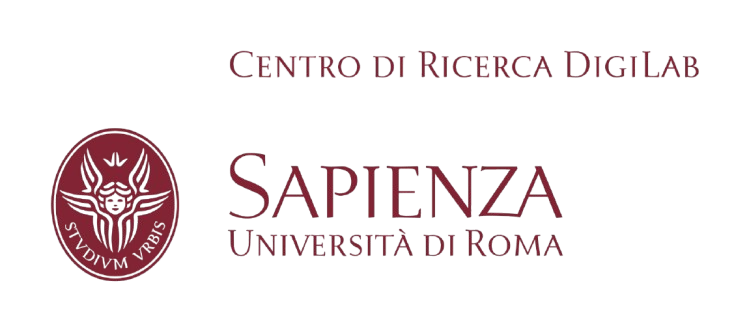
IT Partners

Centro di Ricerca DigiLab
Il Centro, fondato da Sapienza Università di Roma nel 2012, è un centro interdipartimentale di ricerca nato su iniziativa di cinque dipartimenti umanistici e vari dipartimenti di ingegneria e informatica. Dal 2017, altri dipartimenti, tra cui Architettura, Storia e ISO, si sono uniti. Oltre 100 ricercatori partecipano alle attività del DigiLab, collaborando con aziende, associazioni e istituzioni. La missione principale di DigiLab è potenziare la ricerca interdisciplinare nei beni e nella produzione culturale, gestire tecnologie digitali per la cultura, valorizzare i patrimoni culturali e offrire corsi di specializzazione e apprendimento continuo. Le attività del centro includono la valorizzazione e comunicazione dei patrimoni culturali online, la digitalizzazione e metadatazione di collezioni secondo standard europei e il coordinamento della Sapienza Digital Library. Inoltre, DigiLab si occupa della gestione di laboratori che sviluppano tecnologie digitali per la ricerca nel campo del patrimonio culturale, della realizzazione di installazioni digitali e produzioni video legate ai beni culturali e alla comunicazione, e dell’organizzazione di corsi di apprendimento permanente, anche in collaborazione con enti esterni e tramite e-learning. Infine, il Centro promuove e partecipa a progetti di ricerca finanziati da bandi europei, nazionali e regionali, e coinvolge gli studenti nelle attività istituzionali, in collaborazione con i corsi di studio.

Alicubi srl
Alicubi has almost twenty-five years of experience in the ICT sector, particularly in applications related to historical research, archive management, and the enhancement of cultural heritage. In recent years, Alicubi’s Digital Humanities Lab has contributed to several high-value academic and scientific projects, such as the “1938-Sapienza Leggi Razziali” Project by Dipartimento di Storia Antropologia Religioni Arte Spettacolo of Sapienza Università di Roma, on the impact of the fascist regime’s anti-Semitic policies at Rome’s university (https://1938-sapienza-leggirazziali.it/). Informatica Umanistica is a company established in 2013 by Davide Merlitti, after having gained twenty years of experience in the IT sector applied to cultural heritage, collaborating, above all, with the Italian Ministero dei beni e delle attività culturali e del turismo (now Ministero della Cultura) e the Scuola Normale Superiore di Pisa. In collaboration with Informatica Umanistica, Alicubi will support projects by creating the data model and developing the IN-Italja Digital Atlas, defining thematic paths and tools to explore the collected data across time and space.

Augusto Cherchi
Historian and archivist, he is the CEO of Alicubi. With extensive experience in public history, archiving, and cultural heritage preservation, he has led numerous projects that integrate technology with historical content, focusing on the digitization and accessibility of archives, libraries and cultural assets, and digital humanities.

Davide Merlitti
Computer IT consultant, application developer, systems analyst and project manager in a wide variety of business applications. Particularly interested in xml related design, web services, service oriented architectures, cloud computing and mobile apps in the fields of cultural heritage and digital humanities. Programming languages: C/C++, C#, PHP, Java, ActionScript 3; IDEs: Visual Studio. NET, Xcode, Eclipse, NetBeans, MonoDevelop, SharpDevelop, NuSphere PhpED, Borland C++; software libraries and frameworks: .NET Framework, MFC, ATL, QT4, Prado3; design and management tools: UML, Visual Paradigm for UML, Oxygen XML Editor, Protege, Microsoft Visio, Microsoft Project, SparxSystem Enterprise Architect; methodologies: Unified Software Development Process; technologies: Digital Rights Management Systems.

Regesta - SAP Brescia
Founded in 1996, Regesta.exe is an Italian firm that emerged from a team involved in two innovative technology projects for Cultural Heritage. These projects were undertaken for the historical archives of IRI (Industrial Rebuilding Institute) and the diverse institutions, enabling them to create, manage, retrieve, and access online documentary, iconographic, and audiovisual resources, as well as general cultural heritage information. The “Digital Archives & Memory Storage” project, developed in collaboration with the Archivio di Stato di Napoli between 2002 and 2004 within the Ten Telecom European program, adhered to standards of interoperability, portability, modularity, and web-based technologies. This project culminated in the web-based xDams platform, which was open-sourced in 2012. In recent years, Regesta has worked and continues to work for various institutions and companies, such as Intesa Sanpaolo, Mediobanca, Eni, Instituto Luce, Chamber of Deputies, Quirinale, Fondazione Gramsci, Istituto Sturzo, Generali, Cdec Milano, Regione Emilia-Romagna, Archivio storico capitolino, Fondazione Cini, Pirelli, Italgas. Since 2008, Regesta.exe has invested in research on Semantic Web and Linked Data technologies. Its expertise in managing large-scale Linked Open Data repositories and automating LOD production processes and publications from legacy systems has earned it significant recognition. For the creation of the catalogue of digital data and documents of the Chamber of Deputies in 2011, Regesta designed an ontology description in XML / RDF and a specific namespace, OCD (Ontology of the Chamber of Deputies). Some archival ontologies were then produced, for the management of authority files (EAC-CPF. Ontology for Linked Archival Data) and for the management of inventory descriptions (OAD. Ontology for Archival Description). Subsequently, Regesta.exe published the LODs of the Heritage Service of the Emilia-Romagna Region and those of the CDEC of Milan, for which the Shoah Ontology was also created. These projects were followed by those with the National Museum of Science and Technology, with Intesa San Paolo, (for the publication of their photographic archive data and for Egeli archival fonds), with Fondazione 1563 and Fondazione Einaudi. A significant series of activities involving LODs was undertaken with the Institute of the Catalogue and Documentation, resulting in the General Catalogue of Cultural Heritage—a website entirely built upon LOD-published data—and the Photographic Archive.